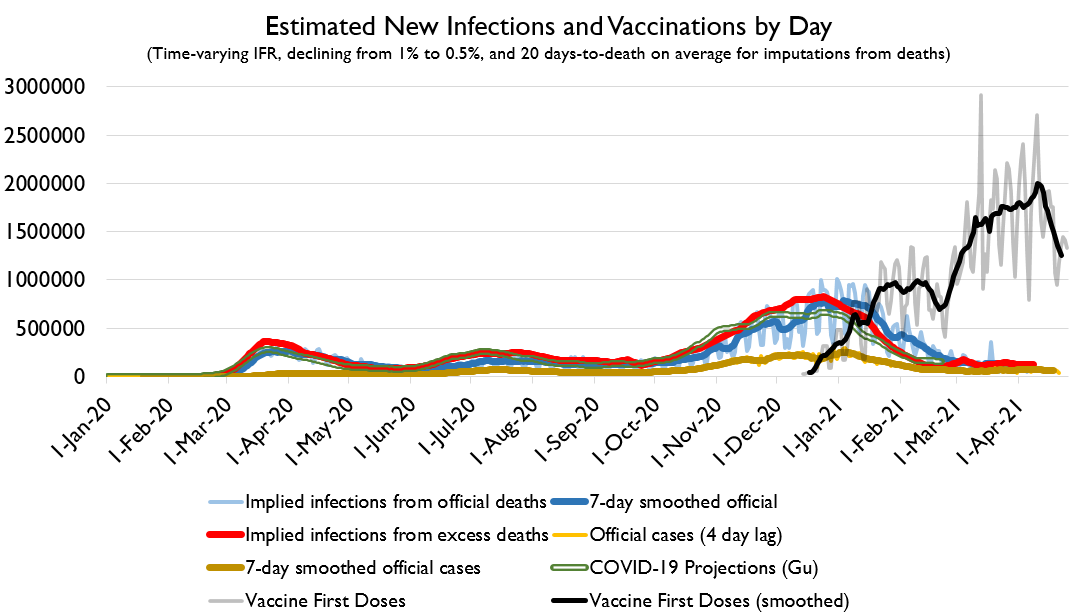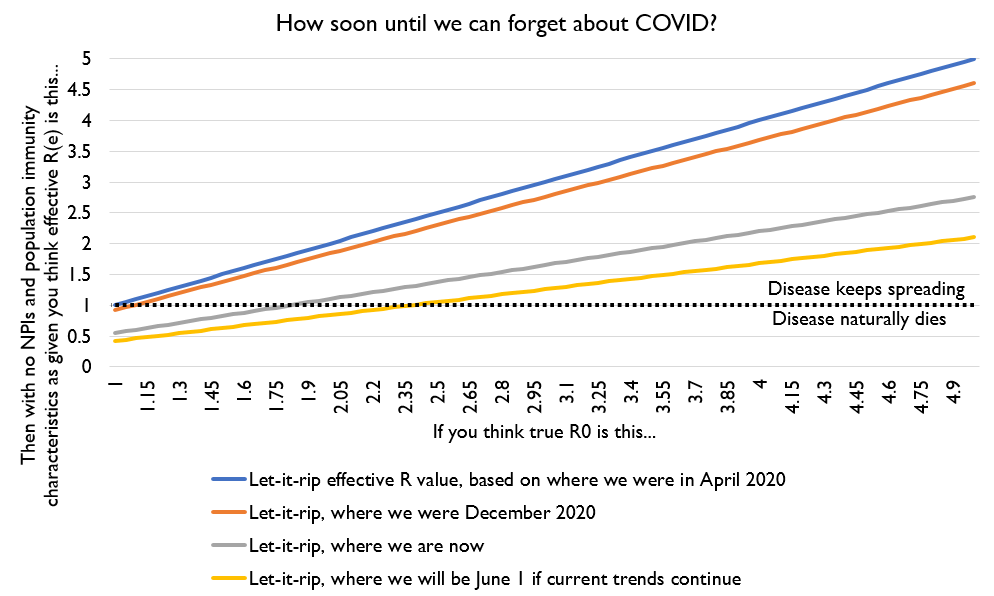
Death update:
US deaths remain above normal levels, and are only very slowly inching towards normalcy. This is true even if you exclude Michigan's current outbreak from US totals.

US deaths remain above normal levels, and are only very slowly inching towards normalcy. This is true even if you exclude Michigan's current outbreak from US totals.


cc @TPCarney
Here's New York for example. The winter wasn't as bad as April, but was still very bad, and New York still hasn't returned to quite normal death rates. 

Alternatively, death rates have returned to approximately normal levels in some places, here as just examples drawn more or less at random, are Maryland and Wisconsin. 



But don't get cocky folks. Sometimes you're doing fine but your neighbor isn't! Here's PA and IL, as an example of neighbors to MD or WI. 



So what we're seeing is a lot of places coming out of their winter wave, but some places having ANOTHER wave starting up. Yikes!
The pace of vaccination is definitely slowing down. However, it remains WAY ahead of the pace of infection spread. 

As a result, here's the share of people vaccinated vs. the share who have probably been infected.
We're up to 40% of the population at-least-first-dosed. Not 40% of adults! 40% *of the population*. That's pretty good!
We're up to 40% of the population at-least-first-dosed. Not 40% of adults! 40% *of the population*. That's pretty good!

Probably some vaccines went to people who had previously been infected, and some infection-derived immunity was worn off, so it's likely the share with some level of resistance is around 50-55%.
But since we know that none of the vaccines are 100% effective, accounting for probable overlap and incomplete immunity from prior infections, it's likely that right now we have approximately 45% actual immunity.
So does this mean we're close to herd immunity?
Well, that depends. Herd immunity means that you need R0 * Susceptible population < 1. Susceptible population right now is probably about 55% (100% - 45%).
Well, that depends. Herd immunity means that you need R0 * Susceptible population < 1. Susceptible population right now is probably about 55% (100% - 45%).
There are disagreements about R0. R0 is the rate at which COVID would spread with no controls in a totally susceptible population. Some people say this is 5 or 6. Some people say this is 3 or 4. In practice we've rarely observed >2.5 in large populations post-Wuhan.
So depending on your theory of "how contagious is COVID in a susceptible population taking no precautions," you end up with very different estimates of "how high does herd immunity need to be."
Full disclosure, I am a low-R0 person. I do not think that R0 is 5 or 6. I suspect that in large populations with complex interactions COVID's actual R value is below 3, but with enormous variation at the individual level.
I think that moderate-R0, high-k is the best model of how COVID spreads both because it explains well the spread we've observed and the spread we have *not* observed, i.e. it "Explains" a lot of the "hard to explain" variations in places that have gotten off easy.
But YMMV. Anyways, here's the graph of "If you think R0 is this, then you must think effective R is this at population resistance level X" 

So for a low-R0 person like me, we are ALMOST going fast enough to let-it-rip and throw caution to the winds in.... June.
But not quite fast enough. Must vaccinate faster!
But not quite fast enough. Must vaccinate faster!
But if you believe R0 is even higher, if you think R0 is 4, then we wouldn't hit herd immunity until September or October. If you think R0 is 5 or 6 then you basically do not expect to *ever* hit herd immunity.
It will sound crazy to people that we might "never hit herd immunity," but the idea is the disease would keep have outbreaks in non-immune pockets, surviving and mutating enough that it can crop up recurrently in new generations of kids or through selective mutation.
COVID isn't very lethal for kids so this wouldn't be *quite* as bad as some other diseases remaining endemic, but it still would be a pretty bad thing, especially if a new strain mutated which DID kill kids at higher rates.
Key to remember that since COVID began, around 3 million new non-immune people were born in the United States. That's more than enough to keep this disease inching along for a long time.
• • •
Missing some Tweet in this thread? You can try to
force a refresh




